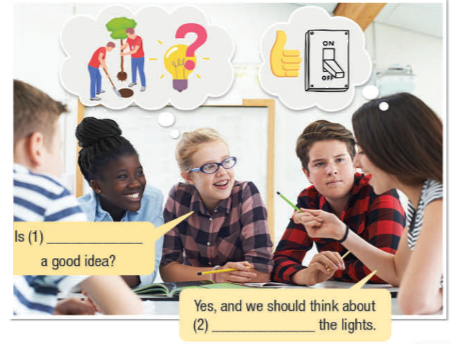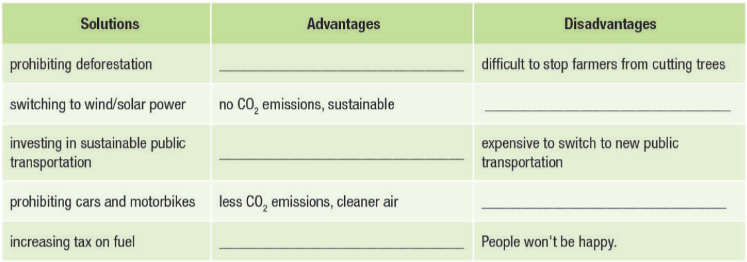Đừng bỏ lỡ những tính năng hấp dẫn của Baitap365.com
Let's Talk! In pairs: How does the activity in the picture help the environment? What things do you do that help the environment? New Words a. Match the underlined words with the definitions. Listen and repeat. b. In pairs: Talk about things that can be done to help the environment where you live. Reading a. Read the magazine article and circle the main idea. b. Now, read and answer the questions.
Let's Talk!
In pairs: How does the activity in the picture help the environment? What things do you do that help the environment?
(Theo cặp: Hoạt động trong tranh giúp ích gì cho môi trường? Bạn làm gì để giúp ích cho môi trường?)

New Words - a
a. Match the underlined words with the definitions. Listen and repeat.
(Nối các từ được gạch chân với các định nghĩa. Lắng nghe và lặp lại.)
|
1. Governments should prohibit farmers from destroying forests to stop deforestation. 2. We can switch from oil to solar power. 3. Governments should increase the tax on gas to make it more expensive. 4. Biofuels are much cleaner than fossil fuels. 5. If we continue to consume fossil fuels, global warming will get worse. 6. Wind and solar energy are more sustainable than fossil fuels. |
a. use something, usually in large amounts b. energy made from living things c. part of the money that we earn or spend, which goes to the government d. stop something by using a rule or law e. change to something different f. using natural products and energy that doesn't damage the environment |
New Words - b
b. In pairs: Talk about things that can be done to help the environment where you live.
(Làm theo cặp: Nói về những việc có thể làm để giúp ích cho môi trường nơi bạn sống.)
We should prohibit motorbikes in our town center.
(Chúng ta nên cấm xe máy ở trung tâm thị trấn của chúng ta.)
Reading - a
a. Read the magazine article and circle the main idea.
(Đọc bài báo trên tạp chí và khoanh tròn ý chính.)
1. the effects of global warming
(tác động của sự nóng lên toàn cầu)
2. ways to stop global warming
(cách để ngăn chặn sự nóng lên toàn cầu)
July 8, 2021
By James Trần
The Truth about Global Warming
More and more teenagers are worried about the environment. Teen World takes a look at the biggest environmental problem facing our world.
Teens everywhere are re becoming more in more interested in ponment. The main issue today is global warming. It's caused by the increase of greenhouse gases, which keep the heat from the sun in the air. Sulfur dioxide (SO2) is one of the most common greenhouse gases. It's mostly caused by burning fossil fuels. We consume fossil fuels for our transportation and the energy in our homes. Deforestation is another human activity that only makes global warming worse. Trees remove greenhouse gases from the air, so we need to protect the forests.
What can we do? First of all, in order to reduce greenhouse gases, we should shut down coal and of power plants. We should switch to more sustainable kinds of energy, such as wind and solar power, even if they cost more. Instead of gas, we could switch to using biofuels, which are made from plants and other living things. Secondly, we should prohibit cars and motorbikes from downtown areas and increase the tax on gas to make it more expensive to use them. Using more electric vehicles, especially electric buses, is another good idea.
Protecting our forests and planting more trees are both very important. It's hard to stop farmers from cutting down trees, so governments have to make strong laws to protect forests.
There are many things we can do at home to help. We can all help save energy at home by turning off the lights and also switching to energy-saving devices.
These are the solutions we can use to stop global warming. We can still save our planet if people act now.
Reading - b
b. Now, read and answer the questions.
(Bây giờ, hãy đọc và trả lời các câu hỏi.)
According to the article,…
(Theo như bài báo,…)
1. what creates sulfur dioxide?
(điều gì tạo ra sulfur dioxide?)
2. the word consume in paragraph 1 is closest in meaning to ___________.
(từ tiêu thụ trong đoạn 1 gần nghĩa nhất với)
a. eat (ăn)
b. use (sử dụng)
c. destroy (hủy hoại)
3. what could we replace gas with?
(chúng ta có thể thay gas bằng gì?)
4. what should we stop using in the busy parts of towns?
(chúng ta nên ngừng sử dụng cái gì ở những khu vực sầm uất của thị trấn?)
5. how can people save energy at home?
(làm thế nào mọi người có thể tiết kiệm năng lượng ở nhà?)
Reading - c
c. Listen and read.
(Nghe và đọc.)
Reading - d
d. In pairs: Do you remember to switch off the lights? How else do you save electricity?
(Theo cặp: Bạn có nhớ tắt đèn không? Làm thế nào khác để bạn tiết kiệm điện?)
Grammar Meaning & Use - a
a. Look at the picture. What do you think the people are saying?
(Nhìn vào bức tranh. Bạn nghĩ mọi người đang nói gì?)

Grammar Meaning & Use - b
b. Now, listen and check your ideas.
(Bây giờ, hãy lắng nghe và kiểm tra ý tưởng của bạn.)
Grammar Meaning & Use - c
c. Listen and repeat.
(Nghe và lặp lại.)
Is planting trees a good idea?
(Trồng cây có là một ý tưởng tốt không?)
Yes, and we should think about turning off the lights.
(Vâng, và chúng ta nên suy nghĩ về việc tắt đèn.)
Grammar Form & Practice - a
a. Unscramble the sentences.
(Sắp xếp lại câu.)
1. expensive/will/solar/to/Switching/power/be
Switching to solar power will be expensive.
2. burning/instead/We/power/should/us/allcl/wind
____________________________________________
3. Is/more/solution?/good/trees/a/planting
____________________________________________
4. by should/Wo/start/electricity/saving
____________________________________________
5. on/a/great/fuel/idea.Increasing/is/tax
____________________________________________
6. about/should/developing/think/We/biofuels.
____________________________________________
Grammar Form & Practice - b
b. Circle the correct word.
(Khoanh chọn từ đúng.)
1. Prohibit/Prohibiting cars can reduce/reducing traffic emissions.
2. We can reduce/reducing deforestation by plant/ planting more trees.
3. Governments should think/thinking about switch/switching to sustainable energy.
4. Will consume/consuming less coal decrease/decreasing emissions?
5. Protect/Protecting forests can save/saving many animals.
Grammar Form & Practice - c
c. In pairs: Ask your partner what they think you can do to help the environment in Vietnam using the gerund phrases in Task a and Task b.
(Theo cặp: Hỏi bạn của bạn xem họ nghĩ bạn có thể làm gì để giúp ích cho môi trường ở Việt Nam bằng cách sử dụng các cụm danh động từ trong Bài a và Bài b.)
What do you think we can do to help the environment in Vietnam?
(Bạn nghĩ chúng ta có thể làm gì để giúp môi trường ở Việt Nam?)
I think we can help to reduce air pollution by burning less coal.
(Tôi nghĩ chúng ta có thể giúp giảm ô nhiễm không khí bằng cách đốt ít than hơn.)
Pronunciation - a
a. Focus on the /lz/ sound.
(Tập trung vào âm /lz/.)
Pronunciation - b
b. Listen to the words and focus on the underlined letters.
(Nghe các từ và tập trung vào các chữ cái được gạch chân.)
fuels (nhiên liệu)
bicycles (xe đạp)
Pronunciation - c
c. Listen and circle the words you hear.
(Nghe và khoanh tròn những từ bạn nghe được.)
|
1. fossil 2. recycles 3. spends |
fossils recycled spells |
Pronunciation - d
d. Take turns saying the words in Task c while your partner points to them.
(Thay phiên nhau nói các từ trong Nhiệm vụ c trong khi đối tác của bạn chỉ vào chúng.)
Practice - a
a. Practice the conversation. Swap roles and repeat.
(Thực hành các cuộc đối thoại. Đổi vai và lặp lại.)
Tom: What's the best way to stop global warming?
(Cách tốt nhất để ngăn chặn sự nóng lên toàn cầu là gì?)
Liz: Hmm. I'm not sure. Is switching to solar power a good idea?
(Hừm. Tôi không chắc. Chuyển sang năng lượng mặt trời là một ý tưởng tốt?)
Tom: I think it would be too expensive.
(Tôi nghĩ nó sẽ quá đắt.)
Liz: OK. Would prohibiting cars in city centers be a better solution?
(Được rồi. Liệu cấm ô tô trong trung tâm thành phố có phải là một giải pháp tốt hơn?)
Tom: I think so. It will reduce CO2 emissions.
(Tôi nghĩ vậy. Nó sẽ làm giảm lượng khí thải CO2.)
Liz: Maybe you're right. I think using clean public transportation might be a good solution.
(Có lẽ bạn nói đúng. Tôi nghĩ rằng sử dụng phương tiện giao thông công cộng sạch có thể là một giải pháp tốt.)
Tom: I'm not so sure. Switching to electric buses. will be very expensive.
(Tôi không chắc lắm. Chuyển sang xe buýt điện. sẽ rất tốn kém.)
|
asking people to save electricity (bảo mọi người tiết kiệm điện) |
using wind power (sử dụng năng lượng gió) |
|
difficult to do (khó để làm) |
too unreliable (quá không đáng tin cậy) |
|
increasing tax on fuel (tăng thuế nhiên liệu) |
increasing the price of cars and motorbikes (tăng giá xe ô tô và xe máy) |
|
I don’t think so. It will make people angry. (Tôi không nghĩ vậy. Nó sẽ làm mọi người tức giận.) |
I don’t think so. It won’t stop people from buying them. (Tôi không nghĩ vậy. Nó sẽ không ngăn cản được việc mọi người mua chúng.) |
|
using electric cars (sử dụng ô tô điện) |
riding bicycles to work (đi xe đạp đi làm) |
|
They’re too expensive to buy for some people. (Với một số người chúng quá đắt tiền để mua.) |
Riding bicycles is dangerous in some countries. (Đạp xe nguy hiểm ở một số nước.) |
Practice - b
b. Make two more conversations using the ideas on the right.
(Thực hiện thêm hai cuộc hội thoại bằng cách sử dụng các ý tưởng bên phải.)
Speaking - a
GLOBAL WARMING SOLUTIONS
(GIẢI PHÁP CHO NÓNG LÊN TOÀN CẦU)
a. You're a scientist discussing ways that your government can fight global warming. Complete the table with ideas from the reading or your own ideas. In pairs: Discuss and agree on two solutions which you think are the most effective.
(Bạn là một nhà khoa học thảo luận về những cách mà chính phủ của bạn có thể chống lại sự nóng lên toàn cầu. Hoàn thành bảng với ý tưởng từ bài đọc hoặc ý tưởng của riêng bạn. Theo cặp: Thảo luận và thống nhất về hai giải pháp mà bạn cho là hiệu quả nhất.)
Prohibiting deforestation will reduce greenhouse gases. What do you think?
(Cấm chặt phá rừng sẽ làm giảm khí nhà kính. Bạn nghĩ sao?)
I think it will be difficult to stop farmers from cutting trees.
(Tôi nghĩ sẽ rất khó để ngăn chặn nông dân chặt cây.)

Speaking - b
b. Join another pair and compare your choices. Did you choose the same solutions? Why (not)?
(Tham gia một cặp khác và so sánh các lựa chọn của bạn. Bạn đã chọn các giải pháp tương tự? Tại sao không)?)
Mẹo tìm đáp án nhanh
Search Google: "từ khóa + baitap365" Ví dụ: "Bài 5 trang 13 SGK Vật lí 12 baitap365